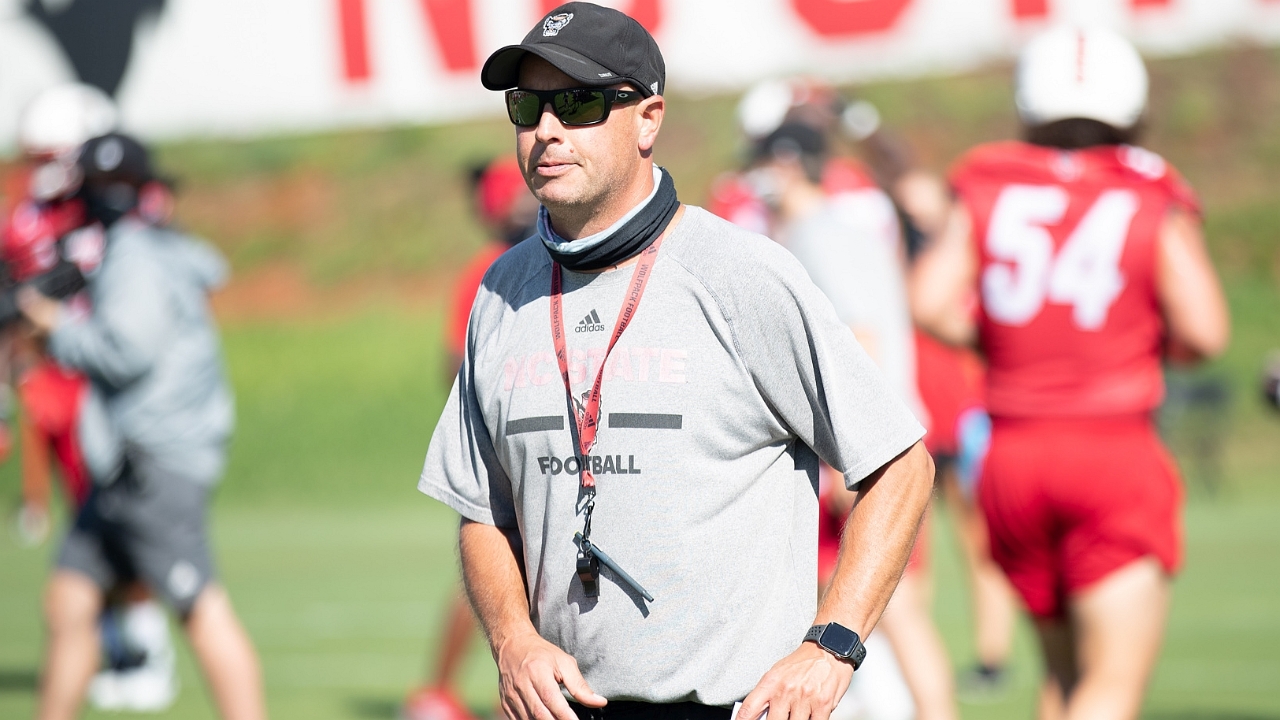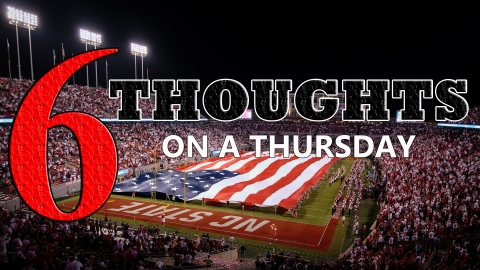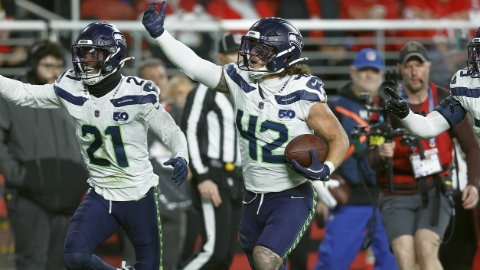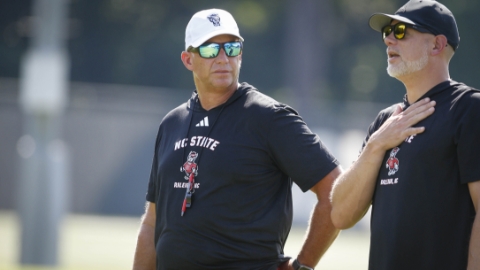Kurt Roper: "It's Our Job To Score Points As An Offense And Win Football Games"

NC State offensive coordinator Kurt Roper met with the media to discuss taking over the role, his expectations for the offense, and much more.
NOTE: Click the video above to watch the interview with coach Roper.
Kurt, first of all, congratulations on getting the position. What have been your thoughts on, you know, so far, what's changed for you as far as the position is concerned?
Well, I appreciate it. Thank you. I'm excited about it and appreciative of Coach giving me this responsibility and this opportunity. And, shoot, it's really what I, you know, see myself as. I see myself as a quarterback coach first and a coordinator. I've been fortunate to do it a long time and been trained by Coach Cutcliffe, in my opinion, one of the best to put together an offense and understand how to teach and coach offensive football. And to answer your question, really my role, the biggest part right now during this phase of the calendar in college football is I'm much more involved in all aspects of recruiting. Each position I'm more involved in trying to explain to them what the vision is, kind of what our thoughts on offensive football is, and then trying to put in a system while we're in and out of the office and on the road recruiting with those things. So, maybe a little bit more busy.
And as a quick follow-up to that, you know, you obviously got a chance to work with CJ Bailey this past season, see his development, things along those lines. What types of things do you feel like you want to see from him as far as a growth standpoint this offseason? And how much did you see throughout the season from him, too?
Well, I think you take it in phases as far as growth goes, too. Right now we're in the offseason conditioning, so bigger, stronger, faster is a mindset. He's obviously a very long athlete and can get bigger as he gets older. He got here, he was 17 years old, and so the weight room is going to pay dividends for him, and how he works is important. And then the second phase is in the film room, how he's growing his knowledge of football in general. I really teach football in three phases. You got to know the system one, you have to understand situational football two, and then you have to really start to grasp what defenses are trying to do. And all of those are never-ending, they're unending, right? And so he's working on that part of it in the film room. And then the third phase is becoming a leader, you know, on the field and taking over. He's the guy that sets up the throwing and has to get the guys together to, you know, just become better fundamentally and what we're doing schematically on the field.
Why do you feel like you are really the guy for this job?
Well, I, really I look at that as Coach Dorn's decision, and now my job is to respond to that. I think this is 30 years of coaching football. I've been a coordinator at several different places and feel like I've been a successful coordinator, and we've won a bunch of football games. But, you know, like I said, to begin with, I'm appreciative of Coach giving me that responsibility. And now it's my job to do the best job I can and help us win as many football games as I can.
You mentioned you going through these recruiting visits and sharing the vision of your program, the offense, what it's all going to look like. What are those conversations like when you talk about that vision? Is there any kind of difference we should expect between what we saw in the past couple of years with NC State and you now that you're taking over as OC?
Yeah, I think, one of our challenges is to score more points as an offense, right? And I think if that's one of your challenges, then you have to have the intentions, the mindset to go out there and try to score more points. So, the vision, I think what you're going to see is first and foremost, we're going to try to put guys on the football field that are explosive with the football. I think those are the guys that score the points for you. And we've got to try to put them into good situations. We have to give them enough weapons, enough tools in their tool belts, per se, to get themselves open or to have good angles in the run game. So schematically, we've got to have the mindset to go out there and put our best players on the field with the ability to score, right? And so you've got to figure out who those guys are, and we'll work to that.
Yeah, and you mentioned the recruiting process, sir. When you're recruiting, obviously, you want guys to fit a system. But do you ever run across talent where you say, okay, schematically, I'm willing to adjust to what this kid's skill set is? Do you ever find yourself recruiting that type of player?
Sure, you have a system and you recruit to it, right? But it is still college football. Sometimes, you know, maybe it's not a perfect match as far as that goes. So to answer your question, yes, it's our job to use the skill set. If a guy earns a right on the practice field and shows that he can be explosive with the football, we've got to spend a lot of time figuring those things out. But yes, you've got to adapt. Sometimes, you have a guy at quarterback position that maybe is better within the pocket. Sometimes, you have a guy that is, you know, somebody you can count in the run game, right? Sometimes, you have more tight ends than receivers. Sometimes, you have more wide receivers. Sometimes, you have versatile running backs that can count in the pass game and you can put them in those situations. So you've got to spend your time learning what the strengths are of all our players.
How have you seen a guy like Gavin Locklear grow as a coach, through your time just being at NC State and seeing him, you know, dive into coaching?
He's passionate about NC State. He's passionate about coaching football. He brings a lot of energy to the football field. He's a guy that spends time trying to learn the game and improve his knowledge of the game as it goes. So he can be obviously very helpful in the planning process each week. But he's not new to this game. He's not young to this game. He's got a lot of experience. Maybe it's not necessarily as a full-time coach, as we say, and he's stepping into that role. But he's been coaching a lot of football for a long time. And we're fortunate to have him on the staff. We're fortunate to get his energy and passion, about NC State.
And just to follow up on that, he's been on the road recruiting before they even had this title. You know, what does he mean to the program in that sense and being able to recruit at a high level that he is right now?
Well, obviously, he wore the uniform, right? He was in the building. So he has a lot of knowledge to, it's easy for him to explain our university and what's great about our university. And then he is a little bit younger. So the relationships, maybe he's more relatable in that sense. And so, like I say, he's passionate about the university. He's energetic about the job that he has. And I'm sure appreciative like we all are of the job. I say this all the time, man, your hat and whistle is not guaranteed. You have to be thankful that you have a hat and whistle and you can go coach. And I think he takes that responsibility, you know, very highly.
So maybe you've already touched on this. Just where are you at on tempo? I know it's been kind of the rage earlier a few years back in college football, maybe dialed back a little bit now. How do you view it?
Well, I think you have to have the ability to control tempo. And I will say this, I think it's easier to teach them to go fast and then slow them down rather than go slow, then speed them up. So I think we've got to learn how to go fast. And if you want to go fast, you have to be able to get lined up quickly. And so if you get lined up quickly, you have the chance to control tempo. And then I think you have several ways to control that tempo, whether it's get back into an 11-man huddle, a sugar huddle, a tempo play, a one-word play, as you see people doing. But if you want to control tempo, the first thing you have to do is be able to go fast.
And just to counter or additional to that, I don't know if you touched on CJ a little bit, but just him developing from year one to year two, what would you like to see from him moving forward here in the spring and then going into next year?
Like I said, I think the biggest challenge for any quarterback is understanding defensive football and taking the information you can get from the other side of the ball pre-snap and use it or to fix your problems. Like, all the quarterbacks and I get tickled, they all want five wides and go fast and let's get as many guys out in the route as we possibly can. And I say, yep, let's do that.
All right. But you better understand protection because you can be hot really, really quickly. And then your mom might be mad at me if you get hit really, really hard. So understanding the point I'm trying to make is, man, he's got to understand where his hots are and protections as we grow in that world, how to go from one side, one run to the other side based on rotation and those things. So really just understanding, defensive football, growing that aspect is a never ending process, right? But something that I think he can make strides in.
Very kind of feeding off of James' question from earlier. This team last year was one of the slowest tempo teams in the country at 29.6 seconds per snap. Do you feel like that's something that you want to focus on this offseason and get this team being a more high tempo or up-tempo offense?
I think we have to start there, right? Again, if you want to increase your tempo, you have to teach them to go fast, right? Because it's easier to slow down than it is to speed up. And, you know, I think we've got to spend our time on that and we've got to teach how to do that.
How much does it help that you already have a built-in chemistry with the other offensive assistant coaches? And how much impact do you think you've seen over the last year with the communication with the quarterback, with the helmet?
Well, it's obviously helpful that we've all been speaking largely the same language for two years, right? And Joker Phillips and I have been together at three other stops and are largely aligned in our belief system and in what we do. So those obviously being around and having relationships is really important. I'll say this, it's the first time I've ever communicated with a quarterback during the game. And I think it's very beneficial. The tips that you can give him pre-snap about what's about to happen down in distance, field zone, whatever it is, situation in the game. I think that's one of the best tools we've been given as coaches since I've been a coach.
You mentioned, nothing in this business is guaranteed. So, as a husband and a father, what does it mean to be able to stay in this program, you know, for you and your family?
Well, again, I see myself as very fortunate. I've had several jobs in my lifetime and all of them have been great jobs and obviously fortunate to have them. But to be going into my seventh year at NC State, man, I couldn't be happier or, like I say, more fortunate. Coaches let me stick around that long. What a great place to live. What a great university to be a part of. We have everything that we need resource-wise to compete and win at the highest levels. And obviously to raise a family in a place like Raleigh is just second to none. That, to be one place that long is you know, it's not the norm. Right. And my daughter, my daughter, to make a point, she went to six different elementary schools. But since we came back in fifth grade, she's going to go through sixth grade all the way through high school here. And man, I'm just happy I was able to do that for them. And coaches afforded me that.
College football has a funny way of people reuniting. When DJ Elliott popped up, what was it like for you knowing that you had been with them in Colorado?
DJ and I got to work together for a year and obviously we became friends. And man, he's got a great family, too. As you get to know DJ and who he is and who his family is, they're outstanding people. And I'll say this, like DJ and I are good friends and close, but our wives are like sisters now. And so they've gotten really close through the years for some unique reasons. I'll say that. And shoot, we're just fortunate to have them in our lives. But DJ Elliott is obviously trained by Mark Stoops and the Stoops family and has a lot of other people in his lineage. But man, he's a challenge to go against. I've been going against him since I was at Duke and he was at Florida State and I was at Florida and he was at Kentucky. And the man knows how to coach football.
Yeah, Coach, you mentioned earlier explosive weapons and players like that. Looking at the talent you have here going into the spring, I mean, how do you view your skill position talent?
I was talking with Joker just a minute ago. I think we're blessed. I think we got guys that are really talented and good football players. And, you know, like I said early to start this thing, you know, it's our job to score points as an offense and win football games.



